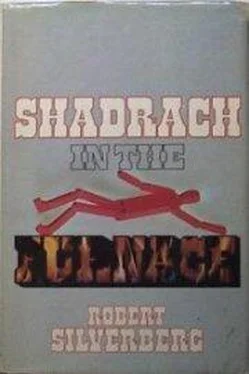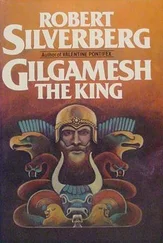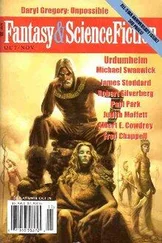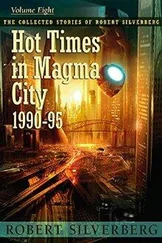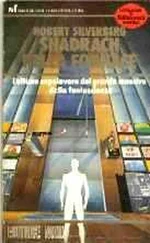Shadrach in the Furnace
by Robert Silverberg
For Norbert Slepyan
It is nine minutes before sunrise in the great city of Ulan Bator, capital of the reconstituted world. For some time now Dr. Shadrach Mordecai has lain awake, restless and tense in his hammock, staring somberly at aglowing green circlet in the wall that is the shining face of his data screen. Red letters on the screen announce the new day:
MONDAY
14 May
2012
As usual, Dr. Mordecai has been unable to get more than a few hours of sleep. Insomnia has plagued him all year; his wakefulness must be some kind of message from his cerebral cortex, but so far he has been unable to decipher it. Today, at least, he has some excuse for awakening early, because great challenges and tensions lie ahead. Dr. Mordecai is personal physician to Genghis II Mao IV Khan, Prince of Princes and Chairman of Chairmen — which is to say, ruler of the earth — and on this day the aged Genghis Mao is due to undergo a liver transplant, his third in seven years. The world leader sleeps less than twenty meters away, in a suite adjoining Mordecai’s. Dictator and doctor occupy residential chambers on the seventy-fifth floor of the Grand Tower of the Khan, a superb onyx-walled needle of a building that rises breathtakingly from the dusty brown Mongolian tableland. Just now Genghis Mao sleeps soundly, eyes unmoving beneath the thick lids, spine enviably relaxed, respiration slow and even, pulse steady, hormone levels rising normally. Mordecai knows all this because he carries, surgically inlaid in the flesh of his arms, thighs, and buttocks, several dozen minute perceptor nodes that constantly provide him with telemetered information on the stale of Genghis Mao’s vital signs. It took Mordecai a year of full-time training to learn to read the input, the tiny twitches and tremors and flickers and itches that are the analogue-coded equivalents of the Chairman’s major bodily processes, but by this time it is second nature for him to perceive and comprehend the data. A tickle here means digestive distress, a throb there means urinary sluggishness, a pricking elsewhere tells of saline imbalance. For Shadrach Mordecai it is something like living in two bodies at once, but he has grown accustomed to it. And so the Chairman’s precious life is safeguarded by his vigilant physician. Genghis Mao is officially said to be eighty-seven years old and may be even older, though his body, a patchwork of artificial and transplanted organs, is as strong and responsive as that of a man of fifty. It is the Chairman’s wish to postpone death until his work on earth is complete — which is to say, never to die.
How sweetly he rests now! Mordecai runs automatically through the readings again and again: respiratory, digestive, endocrine, circulatory, all the autonomic systems going beautifully. The Chairman, dreamless (the motionless eyes), lying as customary on his left side (faint aortal pressure), emitting gentle hhnnorrking snores (reverberations in the rib cage), obviously feels no apprehension about the coming surgery. Mordecai envies him his calmness. Of course, organ transplants are an old story to Genghis Mao.
At the precise moment of dawn the doctor leaves his hammock, stretches, walks naked across his bedchamber’s cool stone floor to the balcony, and steps outside. The air, suffused now with early blue to the east, is clear, crisp, cold, with a sharp wind blowing across the plains, a strong southerly breeze racing through Mongolia from the Great Wall toward Lake Baikal. It ruffles the black flags of Genghis Mao in Sukhe Baior Square, the capital’s grand plaza, and stirs the boughs of the pink-blossomed tamarisks. Shadrach Mordecai inhales deeply and studies the remote horizon, as if looking for meaningful smoke signals out of China. No signals come; only the little throbs and tingles of the implant disks, caroling the song of Genghis Mao’s irrepressible good health.
All is quiet below. The whole city sleeps, save for those who must be awake to work; Mongols are not given to insomnia. Mordecai is; but then, Mordecai isn’t a Mongol. He is a black man, dark with an African darkness, though he is no African either; slender, long-limbed, tall — some two hundred centimeters in height — with dense woolly hair, large wide-set eyes, full lips, a broad though high-bridged nose. In this land of sturdy golden-skinned folk with sharp noses and glossy straight hair. Dr. Mordecai is a conspicuous figure, more conspicuous, perhaps, than he would like to be.
He squats, straightens, squats, straightens, jackknifing his arms out and in, out and in. He starts every morning with a calisthenic routine on the balcony, naked in the chilly air: he is thirty-six years old, and even though his post in the government gives him guaranteed access to the Roncevic Antidote, even though he is thus spared the fear of organ-rot that obsesses most of the world’s two billion inhabitants, thirty-six is nevertheless an age when one must begin conscientiously to take measures to protect the body against the normal unravelings time brings. Metis sana in corpore sano; yes, keep on bending and twisting, Shadrach; make the juices flow; let the old yin balance the yang. He is in perfect health, and his bodily organs are the ones that were in him when he popped from the womb one frosty day in 1976. Up, down, up, down, unsparing of self. Sometimes it seems odd to him that his vigorous, violent morning exercises never awaken Genghis Mao, but of course the flow of telemetered data runs only in one direction, and as Mordecai puts himself through his fierce balcony workout, the Chairman snores placidly on, unaware.
Eventually, panting, perspiring, shivering lightly, feeling alive and open and receptive, hardly worrying at all about the coming surgical ordeal, Mordecai decides he has had enough of a workout. He washes, dresses, punches for his customary light breakfast, and sets about his morning routine of duties.
So, then, the doctor confronts Interface Three, through which he daily enters the residential suite of his master the Khan. It is a ponderous diamond-shaped doorway, two and a half meters high. From its silken-smooth bronze surface jut a dozen and a half warty cylindrical snouts, three to nine centimeters high. Some of them are scanners and sensors, some are audio conduits, some are weapons of ineluctable lethality; and Shadrach Mordecai has no idea which is which. Most likely, what serves as a scanner today may well be a laser cannon tomorrow; with such random shifts of function does Genghis Mao contrive to confuse the faceless assassins he so vividly dreads.
“Shadrach Mordecai to serve the Khan,” Mordecai says in a clear firm voice into what he hopes is today’s audio pickup.
Interface Three, now emitting a gentle hum, subjects Mordecai’s announcement to voiceprint analysis. At the same time, Mordecai’s body is being checked for thermal output, mass, postural stress, olfactory texture, and much more. If any datum should fall beyond the established Mordecai-norm, he could find himself immobilized by loops of suddenly spurting webfoam while the guards are summoned to investigate; resistance at that point might lead to his immediate destruction. Five of these interfaces protect the five entrances to Chairman Genghis Mao’s chambers, and they are the wiliest doors ever devised. Daedalus himself could not have forged more clever barriers to guard King Minos.
In a microsecond Mordecai is recognized to be himself, rather than some cunning lifelike simulacrum on a king-slaying errand. With a smooth hiss of perfectly machined joints and a gentle nimble of flawless bearings the interface’s outer slab glides open. This admits the doctor to a stone-walled inner holding chamber hardly larger than himself. No welcome vestibule for claustrophobes, this. Here he must halt another microsecond while the entire surveillance is repeated, and only after he passes this second muster is he allowed to enter the imperial residence proper.
Читать дальше
